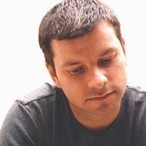Chris Fortier - About Time
Author: Dean Millson
Friday, July 12, 2002

After doing a bit of research I wasn't intrigued anymore, I was embarrassed. For someone who calls themselves a fan of the progressive sound, I realised that I didn't know that much about Chris Fortier at all - but maybe that's more of an indication of the amount of influence that the UK has over the Australian dance scene more than anything else.
For the past decade Chris has been one of the main contributors to the progressive scene in the US. Whether it be by Djing, running Fade Records (which he set up way back in 1995), producing or remixing (He has remixed the likes of BT and Delerium), the success of the progressive sound in the US has a lot to thank Chris Fortier for. Back in 1996, along with long-time friend Jimmy Van M (who mixed Bedrock 2) he also formed the first promotional record pool company in the USA and Canada - ensuring that dancefloors across the US were filled with the most upfront tunes, just as dancefloors over across the Atlantic were.
With an up and coming trip to Australia this year (he'll be along side Satoshi Tommie, and John '00' Flemming when Gods Kitchen makes its way down under again this October) what better timing to find a bit more about Chris, Bedrock 3 and More…
There has been a lot of talk recently about the future of progressive house and also of the "backlash" to how deep and dark things got for a while. What are your thoughts on this-
"Well I think we have gone through it before. The media is quick to jump on something and then quick to trash it. I think kids are impressionable too by some of what they read, so if one magazine is saying progressive is dead, then some people will believe it and start slagging it themselves. A lot of people want to think they are on the cutting edge or that they know what is up, but for the most part they are still being led. I don't know where the music is going. and even if I did, I don't know if I would say because that would lead to another downfall. Myself and my peers, we play music that we like, that goes together cohesively in a set. Hopefully put together to get a strong uplifting reaction from the dancefloor. we have been playing loads of other music besides just the dark sound, but the darker thing is what people or the media picked up on. I am sure we will continue to play deeper sounds but hence the word progressive, the music is always moving forward and fresh ideas are injected giving new life. Now the new life sometimes comes slower then others, but it is always moving forward. I just want to play the best music I can and try my best to play it well each night. That is all I can ask. One thing I do want to point out though, I think there is a difference between dark tracks and deep tracks".
Can you explain a bit of your process in programming and mixing Bedrock Three- How long did it take, how many tracks did you go through- Is it your first CD release- Did you learn anything from it- What was your aim/intention behind it- Is it very representative of a Chris Fortier live set-
"I took my time with it. I had a lot of lead time to look for records. So I went through my entire collection, then thousands of tracks that were sent to me for consideration. The goal was to have a strong flowing mix regardless of the specific records. So I took my time and tried to find records that went together and not just 25 new things in my box. I wasn't worried if the tracks were new or old, I just wanted the mix to flow well. I spent a few months searching for tracks. Mostly I was eliminating things I wasn't going to use. When I got down to about 200 records, I just started working on mini sets and then tried to make the mini-sets fit together. The pacing of the CD was very important. I didn't want to go too slow and I certainly didn't w Tags

